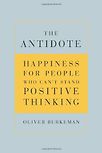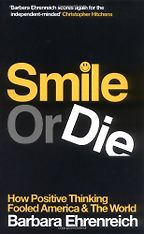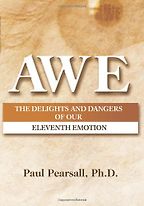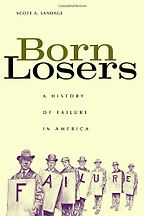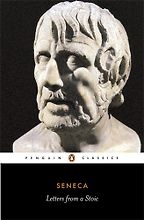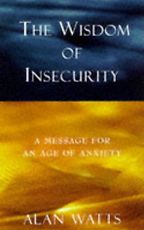Your book, The Antidote, is subtitled “Happiness for People Who Can’t Stand Positive Thinking”. Why do you think our pursuit of happiness through positivity can lead to so much trouble?
Sometimes it is the very pursuit of happiness that stops us from achieving it. Put simply, I think many of the techniques that claim to enable us to achieve happiness don’t work. They are too focused on strenuously stamping out any trace of negativity, rather than cultivating the conditions of real happiness. The more complex and subtler idea is that happiness is impossible to aim for directly. I’m not just talking about all the bad self-help books out there – I think the “cult of optimism” is broader than that. We are all to some extent in its grip, whenever we think that the way to achieve whatever we’re trying to achieve is to go after it vigorously, and that if we believe it will all work out fine then it will.
Your first choice, Barbara Ehrenreich’s Smile or Die, explores further the tyranny of positive thinking.
This is a brilliant political polemic and a critique of the problematic effects of positive thinking. Ehrenreich argues, among other things, that the idea that nothing can go wrong is a terrible philosophy to adopt in the world of business. To some degree she directly attributes the current financial crisis to how positive thinking affected the culture of American business. If you’re a banker, constructing complex financial instruments, the idea that nothing could go wrong is obviously highly problematic. On the consumer level the same goes for homebuyers, thinking that if they want the house of their dreams all they need to do is convince themselves that they can go out and get it, whatever their financial circumstances.
Why does she think this way of thinking came to be so dominant in the US?
Ehrenreich shows that positive thinking came to be a useful ideology for corporate America to instill in its employees and in the population at large. The classic example here is the book Who Moved My Cheese?, a very badly written story about some mice and how they adapt to changes in their environment. The moral is that change happens, you just have to soldier on and look on the bright side. Various companies distributed huge numbers of copies to their employees as a motivational tool. You can see how useful that might be for a company planning huge and often detrimental upheavals for its staff – how helpful it would be if the staff took a compliant stance towards change.
The other powerful part of Smile or Die concerns Ehrenreich’s involuntary immersion in the positive-thinking culture of breast cancer sufferers. In that situation, the pressure to maintain a positive outlook can be felt as an oppressive, aggressive force. When she goes on online discussion forums for people having treatment for breast cancer, and admits to feeling bad about what is happening to her – as you might expect she would – she is jumped on by people who don’t want to let her feel like that. She thinks the message of positive thinking is often there to enable other people to not have to face up to a situation. If someone suffering from cancer is told to be positive at all times, then other people don’t have to confront what is really happening – they don’t have to feel awkward and embarrassed in their company.
How does Paul Pearsall’s book Awe relate to the power of negative thinking?
This is an amazing book that sketches out some alternatives to the very shallow and impractical positive-thinking approach to happiness. Paul Pearsall was a maverick psychologist who lived in Hawaii. He died a few years ago. His book takes as its organising idea the notion that true happiness requires plenty of the emotion that he calls awe.
How does he define awe?
He writes: “The best description I’ve been able to give it so far is that – no matter how good or bad our brain considers whatever is happening to be – it is feeling more totally and completely alive than we thought possible before we were in awe.” It’s an emotion that combines negativity and positivity, and that even has an element of fear in it, of not being completely in control of a situation.
He relates this to very personal events from his own life.
Yes – he has an extraordinary and awful personal story. He begins the book by talking about the difficulties he experienced around the birth of his son, and how those terrifying moments were filled with awe. Then there is a terrible postscript where he describes discovering the body of his adult son, who committed suicide. It is extremely painful, of course, and he makes you feel some of that pain. But he also adds, in a jarring phrase, that he feels more completely alive than he has done at any point he can remember before. So even at that point there is the emotion of awe. His capacity to feel what happened so intensely is still somehow preferable to the alternative. A lot of positive thinking is about shutting off those possibilities, controlling how things are going to go, and trying to know how you’re going to feel about them.
Whereas Pearsall’s argument is that whatever is going on in your life, you must feel it fully?
Yes. He uses the word “openture”, as in the opposite to closure. It’s an awkward word, but maybe the awkwardness is part of the point. It’s the idea that we need to let go of approaches to happiness that involve trying to get the last word on life, to seal everything off neatly. Pearsall argues that openture is preferable on every level. Because in reality, we just wouldn’t want the life that is promised by purely positive thinking. It would shut off much of what it means to be alive.
One of our deepest fears is to be a failure, which Scott Sandage discusses in the context of American cultural history in your next choice, Born Losers: A History of Failure in America.
This is an historical account of changing attitudes towards failure. Sandage takes American culture as his focus, although I think his insights apply far beyond that. The idea of being “willing to fail” gets bandied about a lot these days, mostly by annoying celebrity entrepreneurs who say that “the only way to succeed is to be willing to fail”. I think that’s true, but it goes a lot deeper than how they mean it. And of course we only ever hear from the ones who end up succeeding – and they would say that.
Sandage goes back through history to look at changing ideas of what failure means. He argues that, prior to the emergence of consumer capitalism, people themselves were rarely referred to as failures. Their individual projects might fail, but you didn’t write someone off as a failure just because their expedition or their business venture failed.
So why did our attitude towards failure change?
There are lots of different reasons, but Sandage’s economic reading is that the system of consumer credit and loans needed to categorise people in a more all-round way as good or bad risks. He suggests that the growth of credit ratings agencies was central in starting to define people as successes or failures.
How does this fit into the positives of negative thinking?
There’s a strong argument that part of the difficulty we have with confronting and experiencing failure is the idea that it’s global and final – that it defines a person entirely. The psychologist Carol Dweck has shown that if you treat failure as feedback – evidence that you’re pushing against your present limits – you’ll be much better off.
Our fear of failure and negative thinking are hardly modern phenomena. What does Seneca have to say about this in Letters From a Stoic, written in the fourth century BC?
It’s important to stress that I take a completely mercenary attitude towards Stoicism, picking and choosing the bits that seem to me to be useful techniques for the present day. There are aspects of Stoicism that are very hard to stomach today. For example, the underlying principle that the universe as a whole is in some sense God, with a will or agency of its own, and that rational behaviour consists of aligning yourself with the will of the universe.
I personally take from Seneca and the other Stoics a very interesting attitude towards negative emotions and situations. They had the insight, which later recurs in cognitive behavioural psychology, that it is your beliefs about your circumstances that determine the distress you feel about them, not the circumstances themselves. As Hamlet says: “There’s nothing either good or bad but thinking makes it so.” Positive thinkers take that and say: You must have very positive beliefs about everything. But the Stoics argue that if you rationally analyse those negative beliefs, rather than fight to replace them with positive ones, you will find that there is a lot of solace and consolation to be had.
In researching your book, you met a modern day Stoic and looked at some of the techniques that are still being used.
Dr Keith Seddon is a great Stoic scholar and translator who is very much not part of the academic mainstream. As he puts it, the question that a Stoic would ask in any given situation is: How is this bad for me, and why? There’s a wonderful Stoic technique called “the premeditation of evils”, which involves deliberately visualising the worst-case scenario, instead of the best one. One benefit of that is that you replace limitless panic and fear – which is how we often respond to problems – with a sober analysis of exactly how badly things could go wrong. The answer might still be “really bad” – but not infinitely bad, as the Stoic-influenced psychotherapist Albert Ellis would say. That’s something I put into practice every day, and find helpful.
You’ve also investigated many other ways that people have chosen to live their lives, including mindfulness in Buddhism.
I found very useful the basic insight that underlines Buddhist psychology: That your emotions and your thoughts are in some way not “you”. That the whole concept of what you are is in fact quite problematic, and needs to be called into question. A slightly corny but nonetheless useful way of explaining this is to see your thoughts and emotions as like the weather – they arise and they pass.
I did a silent meditation for a week as part of the research for my book. One of the things that you swiftly learn is that it’s really hard to force your inner world to be calm and tranquil. But then, the point isn’t to try and force it.
Should you just accept what is going on in your life?
Not bad situations, necessarily. It’s important not to interpret this as an exhortation to put up with your lot in life. Rather, you don’t have to be completely attached to and led by your emotions. Take procrastination as a mundane example. When you’re writing a book, if you tell yourself that you have to get into the right frame of mind in order to write, you’re making life even harder for yourself. Not only do you have to write the book, but you also need to be in the right frame of mind to do it! It just adds an obstacle.
In your own book you also discuss negative capability.
This originates with John Keats. He suggested that Shakespeare was the genius he was because of his willingness to rest in uncertainties and doubts and mysteries, without “an irritable reaching after facts and reason”. I blatantly steal that thought, not to assess literary genius but as an attitude of mind towards happiness. We should try to rest in uncertainties and doubts, accepting that they’re a part of us, rather than trying to stamp them out so as not to have to think about them.
The Wisdom of Insecurity by Alan Watts also feeds into this idea.
This is a very thin book but a mind-blowing one. In many ways it was part of my motivation to write my book. Alan Watts was a philosophical populariser. He called himself a “spiritual entertainer”, and went around the world giving lectures and writing popular books about Eastern philosophies such as Zen Buddhism and Taoism. This book is about non-dualism – the theory that in some sense, everything is one. It’s the principle encapsulated in the symbols of yin and yang. These days it is often seen as cheesy and New Age. But there’s vastly more to it than that.
In this book Watts argues that the reason why we feel so insecure is because of all our struggles to feel secure. He was writing in the 1950s, but we surely feel just as insecure, indeed more so, today. He calls this “the law of reversed effort”. Our security-seeking efforts, like many other techniques of positivity, are all about trying to shore up our own egos – to make ourselves into well-defended, separate units. Watts argues that this is based on a fundamental failure to understand how life works.
What does he suggest we do instead?
What he is pointing to is that the concepts of positive and negative are entwined, and must ultimately be transcended. Focusing on only one side of the human emotional repertoire doesn’t work. It denies life, and it denies reality. Trying to live a life that is only positive, Watts would argue, is like trying to imagine a wave that only has a crest and not a trough. Well, that’s not a wave.
July 12, 2012
Five Books aims to keep its book recommendations and interviews up to date. If you are the interviewee and would like to update your choice of books (or even just what you say about them) please email us at [email protected]
Support Five Books
Five Books interviews are expensive to produce. If you've enjoyed this interview, please support us by donating a small amount.

Oliver Burkeman
Oliver Burkeman is the author of The Antidote: Happiness for People Who Can’t Stand Positive Thinking (2012) and Help! How to Become Slightly Happier and Get a Bit More Done (2011). His latest book, Four Thousand Weeks: Time Management for Mortals (2021), is about making the most of our radically finite lives in a world of impossible demands and relentless distraction. You can subscribe to his twice-monthly email, The Imperfectionist, at oliverburkeman.com.

Oliver Burkeman
Oliver Burkeman is the author of The Antidote: Happiness for People Who Can’t Stand Positive Thinking (2012) and Help! How to Become Slightly Happier and Get a Bit More Done (2011). His latest book, Four Thousand Weeks: Time Management for Mortals (2021), is about making the most of our radically finite lives in a world of impossible demands and relentless distraction. You can subscribe to his twice-monthly email, The Imperfectionist, at oliverburkeman.com.

